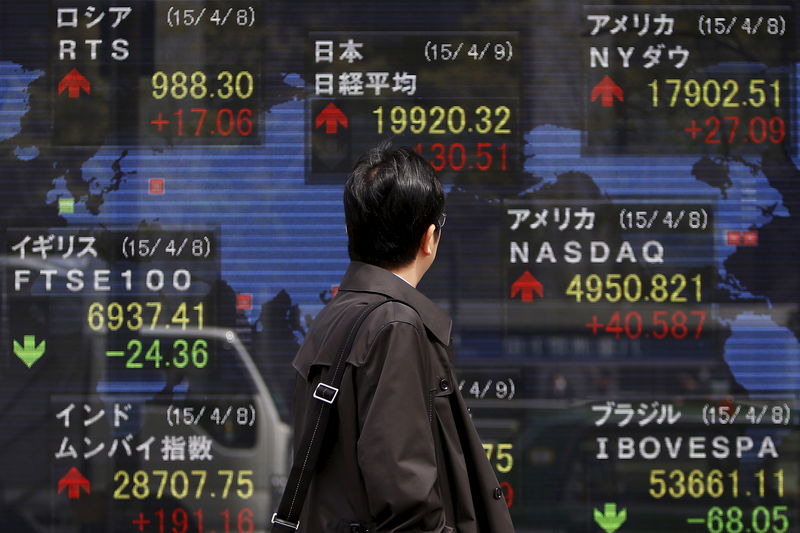(Bloomberg) -- Something strange is happening in the world of global stocks. After years of trading in line with American stocks, Asian equities are no longer moving in tandem.
Asia’s regional benchmark has slumped almost 7 percent in the past year, with the MSCI Asia Pacific Index still not recouping all of the losses during the global market rout if late 2018. By contrast, the U.S. S&P 500 is up 11 percent, hitting all-time highs as recently as Monday.
Several themes have been playing out in Asia:
- A strengthening U.S. dollar has hurt investment flows to emerging markets
- Weakening currencies prompted a number of Asian central banks to raise rates, coloring domestic growth prospects
- Technology stocks, the sector with the largest weighting in Asia Pacific gauge, have slumped amid concerns surrounding chip demand
- The U.S.-China trade war disproportionately affected Asian equities, as economies including Japan’s and South Korea’s saw their exports walloped. While China’s growth has stabilized, so far that’s only helped Chinese equities
- Japan in particular has been a laggard, losing its title as Asia’s biggest equity market as the economy decelerated. The nation now faces a blow from a sales-tax hike
“We’re starting to see a bit of a breakdown in the correlation as investors look a bit deeper into markets now that we’ve had such a successful start to the year,” said Nick Twidale, chief operating officer at Rakuten Securities Australia in Sydney. “Underlying data is certainly painting a better picture in the U.S. than in many other jurisdictions.”
While the Asia Pacific index has done better since the start of the year, gaining 11 percent, it is still lagging behind the S&P 500, which has jumped 17 percent. And it’s done little since the end of January.
Here’s some further perspective on the disconnect:
Tech Sector
Most of the FAANG complex has posted strong earnings, but the semiconductor industry -- which has had its best start to the year since the dot-com bubble -- may have hit a rough patch.
The fourth-largest contributor to the regional Asian index, Samsung Electronics (KS:005930) Co., has been hit by setback after setback. On Tuesday, it reported profit that missed recently reduced analysts’ estimates. That came after the tech giant delayed its first foldable smartphone, while grappling with falling memory-chip revenue.
Prior to Samsung’s results, peers SK Hynix Inc. and LCD panel maker LG Display Co. added to sector concerns after earnings results were lower than expected.
Japan
And then there’s Japan. The Topix index has slumped 8.8 percent in the past year and it’s still among the worst-performing equity indexes in the developed world in 2019. Fund managers have lost interest in Japanese stocks as trade-war and profit outlook concerns cloud the overall sentiment.
China
MSCI Inc.’s plan to expand the weighting of China-listed shares in benchmark indexes tracked by global investors, could be another reason for the rest of Asia falling behind. That decision could see billions of dollars flow into one of the world’s most volatile major stock markets. And the capital has to come from somewhere.
While billions of dollars will head to so-called A-shares as a result, the weighting of Southeast Asian markets will likely drop to about 7.7 percent from 8 percent now, Morgan Stanley (NYSE:MS) analysts Sean Gardiner and Aarti Shah wrote in a February report. Citigroup Inc (NYSE:C). analysts also said in a report that India might get hit.
Renewed Correlation?
With Asian central banks largely following the Federal Reserve’s dovish pivot, policy direction is becoming better aligned. And all signs point to a U.S.-China trade deal in coming weeks or, at least, months, which may help turn regional export figures around. China’s economic stabilization in time could start lifting more boats.
“The U.S. and Asian markets have shown a rise in correlation again,” looking at the first quarter of 2019, said Tai Hui, chief market strategist at JPMorgan (NYSE:JPM) Asset Management in Hong Kong. “A more patient and dovish Fed, economic stimulus from China and ongoing negotiation between Beijing and Washington have prompted both markets to re-rate and recover.”
